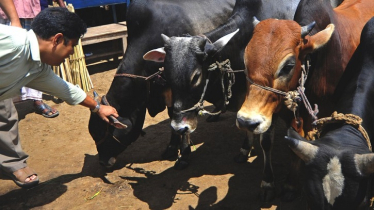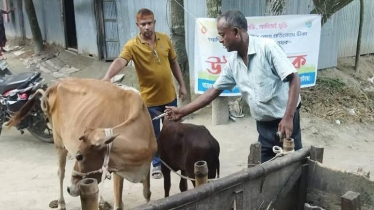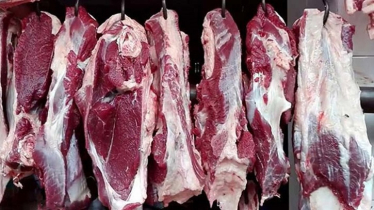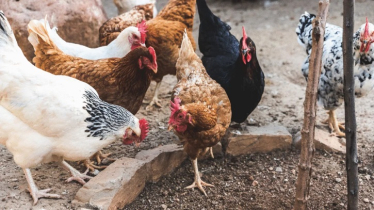
Eid-ul-Azha will be celebrated after a few days. The sacrifice of animals during Eid-ul-Azha is a religious obligation for affluent people. The Eid-ul-Azha economy in Bangladesh is estimated to be worth roughly Tk90,000 crore, with livestock sales accounting for at least Tk70,000 crore.
According to the Ministry of Fisheries and Livestock, the sacrificial animals worth more than Tk60,000 crore were sold across Bangladesh in 2023 on the occasion of the Eid and a total of 1,00,41,812 animals sacrificed. This year around 1.3 crore sacrificial animals have been prepared across the country.
As a large number of animals are sacrificed every year, nearly 60% of the annual export of leather from Bangladesh occurs after this festival. It is necessary to mention that livestock contributed 1.85% of the total GDP in FY 2022–2023.
Livestock management plays a major role in this huge contribution to the economy, which we believe can be further improved. Digitalisation in animal farming and livestock management in modern scientific methods can give new dimensions to the economy.
The rise of precision and digital livestock farming offers an opportunity for more sustainable animal farming practices that improve animal welfare and health. However, the digital transformation of modern animal husbandry has several ramifications for agriculture's technological, social, economic, environmental, and ecological aspects. Digital livestock farming (DLF) technology refers to the approach of livestock farming that farmers employ using IoT, Data Analytics, Computer Vision, and Artificial Intelligence-based Smart Solutions.
The application of digital technologies in livestock management is also known as Precision livestock farming (PLF) which allows farmers and ranchers optimise production and efficiency.
Machine learning is significantly enhancing animal husbandry by providing advanced analytical tools to optimise various aspects of livestock management. By analysing vast amounts of data collected from sensors, wearable devices, and cameras, machine learning algorithms can identify patterns and predict health issues, improving early disease detection and treatment.
With real-time monitoring, farmers can identify sick animals quickly, isolate them, and provide appropriate treatment. This helps reduce the spread of diseases among the animals and minimize the use of antibiotics or severe treatment.
Data analytics-based machine learning can be used to optimize feed efficiency and nutrition by analysing consumption patterns and nutritional needs, thus ensuring better growth rates and productivity.
The Internet of Things and computer vision-based smartphone applications available to Bangladesh's marginal farmers can improve livestock management by providing farmers with solid instruments to boost productivity, efficiency, and animal well-being.
These apps enable farmers to track and manage health records, breeding cycles, and feed inventories with ease, ensuring timely interventions and optimal resource use. Mobile apps also facilitate efficient communication and data sharing among farm workers, veterinarians, and suppliers, streamlining operations and decision-making.
Additionally, features like GPS tracking help in managing grazing patterns and locating animals quickly. Wearable devices and biometric sensors monitor animals’ health, activity, and location, providing real-time data to detect early signs of illness.
This is especially beneficial for large-scale farms or when farmers need to travel, ensuring constant oversight and being able to provide the best care for them remotely. Individual animal care is efficiently carried out by employing robotics and sensor technology based on artificial intelligence.
Already today, pedometers, electronic collars, and ear tags can accurately record the behaviour of a cow, allowing its health status to be studied and monitored.
The increasing demand for animal products has led to significant changes in animal farming practices, with a shift toward more intensive and industrialised methods of livestock production.
As a result, animal welfare and sustainability have become important concerns for consumers, policymakers, and stakeholders in the animal agriculture industry. Data-driven decision-making can assist all stakeholders in animal husbandry to determine the most effective actions for enhancing productivity, suitable market strategy, supply chain management, and ecological balance.
Data-driven policies are developed through the use of Drones, Sensors, RFID tags, and other precision livestock technologies, farmers and ranchers can track individual animals' health, growth, and behaviour in real-time.
Drones are revolutionising livestock management in several developed countries by offering a birds-eye view of farm operations, improving monitoring, and increasing efficiency.
Equipped with high-resolution cameras for aerial perspective and thermal imaging, drones can quickly survey large herds, monitor pasture conditions, optimise grazing patterns and land use, identify individual animals, and detect signs of distress or illness. Blockchain technology is making a significant impact on animal husbandry by enhancing precise tracking of an animal's history. Such transparency helps verifying the authenticity and quality of livestock products.
Livestock plays an important role in Bangladesh’s food security. The Bangladesh livestock sector directly employs 20% and partly employs 50% of the labour force, where it contributes 13.44% of the agricultural GDP. Digitalisation is particularly important for livestock management due to its potential to address several key challenges and enhance the sector's overall productivity and sustainability.
By integrating advanced technologies, medium and marginal farmers will be able to significantly contribute to the country's economy. In rural areas, where veterinary services are often limited, telemedicine and remote monitoring can bridge the gap, ensuring that animals receive timely care. The Government of Bangladesh must take the initiative in the digitalisation of livestock management to lead more efficient, profitable, and sustainable farming systems, which can contribute to economic growth and food security.
___________________________________
The writer is an Assistant Professor, International University of Business Agriculture and Technology, Dhaka. Email: jiboncse07@gmail.com





